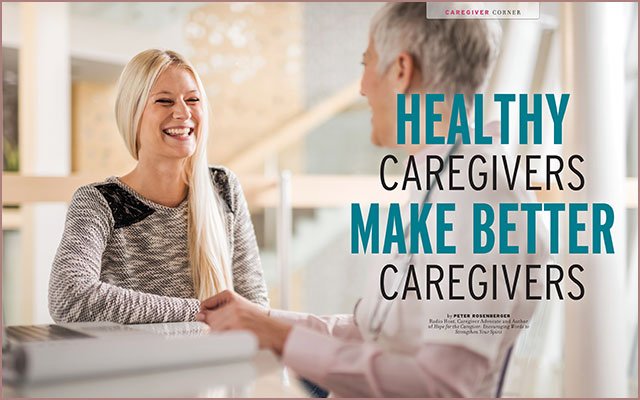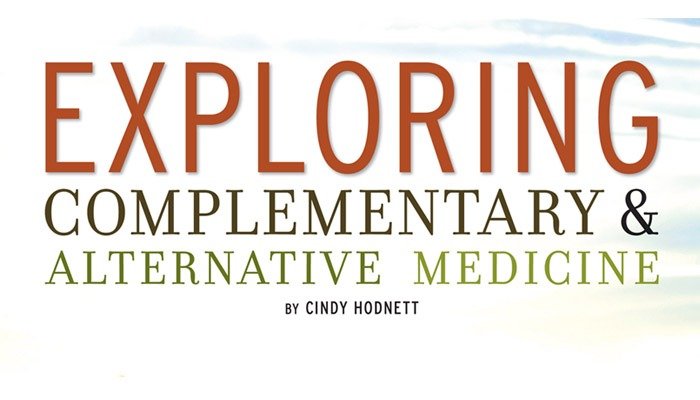Healthy Caregivers

While more than 65 million caregivers—and I am one of them—currently attend to the sickest in our country, statistics show that 72 percent of us fail to see our own physicians regularly. Do the math, and “Houston…we have a problem!”
Caregivers interact with many doctors and often perform tasks previously taken care of by licensed medical personnel. While such experiences teach us a lot about health care, applying that knowledge to our own health is a different challenge. Most caregivers regularly take someone else to see a physician, but when was the last time we saw ours? We often grow so weary of taking others to a doctor’s office that the thought of going to another one—or taking time off work…again!—well, it’s just too much. Those “sandwich” caregivers simultaneously caring for parents and their own family regularly feel stretched too painfully thin to carve out additional hours for their own health needs.
Caregivers often have an array of justifications for bypassing self-care. Many fear leaving their loved ones alone. Often, caregivers don’t have health insurance, and money is tight. They feel guilty for taking time away, or they minimize their own issues compared to what their loved one endures. I’ve heard every excuse, and as a caregiver for three decades, I’ve given most of them myself.
Regardless of the reasons why we don’t see our own doctors, there are two nagging questions we caregivers must face:
- What good are we to our loved one if we have a stroke or develop heart disease, diabetes or some other malady?
- Who will care for our loved one if we are out of the picture for a short-term illness, a long-term issue or worse?
These two questions will grow ever more relevant in the national dialogue as the massive Baby Boomer population requires increasing care. Currently, a vast number of caregivers are already in the danger zone for their own health.
But let’s think logically. If I cut one of my feet, should I ignore it simply because my wife is missing both of her feet? Of course not! Yet the thought sneaks in: “Who am I to stop what I’m doing as her caregiver and attend to an injured foot—when she lost hers?”
That’s the kind of reasoning caregivers tend to use. We push our own health needs to the back burner. But the fact of the matter is that my feet are the only feet she can count on, and I need to be a good steward by properly caring for them. That principle applies across the board to our entire bodies (and hearts, wallets, jobs, etc.).
It can be a serious caregiving landmine for caregivers to ignore their own health needs. Doing so can take us into a dangerous place that can hurt not only us but the loved one in our charge as well.
Because serving as a caregiver can be brutally difficult, it requires extraordinary care for the caregiver. We caregivers can avoid this landmine by scheduling a medical professional to give us a once-over—twice a year. We need an annual physical followed by a checkup six months later for labs, blood pressure, etc. Why wait a whole year to discover high blood pressure, elevated blood sugar or other easily detected warning signs?
Given the stress inherent in caregiving, it is critically important not to “sugar coat” your situation when meeting with your doctor. Your physician may instruct you to change your diet or exercise more, refer you to counseling or even prescribe medication to help with stress. Don’t dismiss sound medical advice.
The primary care physician I’ve seen for nearly a dozen years watches me like a hawk, and I am grateful for him. When I have a minor ailment, sometimes I use a telemedicine service, which saves me hours and money. For a small monthly fee, I have unlimited access to a physician by phone/video, and I can provide a recording/transcript of the call to my primary care physician. An annual lab service is also included in the subscription. The virtual doctor visits don’t replace meeting with my physician, but it’s another addition to the caregiver’s tool belt that can help us live healthier lives.
Caregiving can often feel like a full-contact sport, and it is hard on the body as well as the heart. Daily challenges sap the desire to fix a healthy meal, much less schedule time for yet another doctor visit. But remember: that visit could very well save a caregiver’s life. Make the call and keep the appointment for yourself as a caregiver. Doing so avoids the landmine of failing to treat the one body standing between your vulnerable loved one and an even worse disaster—yours!
Healthy caregivers make better caregivers. Today’s a great day to make healthy decisions!
Peter Rosenberger is a 30-year caregiver, radio host, author, speaker and advocate for caregivers. He hosts a weekly radio show on the topic, syndicated nationally and broadcasted worldwide. Rosenberger is the author of Hope for the Caregiver (2015) and Seven Caregiver Landmines and How You Can Avoid Them (2016).
PainPathways Magazine
PainPathways is the first, only and ultimate pain magazine. First published in spring 2008, PainPathways is the culmination of the vision of Richard L. Rauck, MD, to provide a shared resource for people living with and caring for others in pain. This quarterly resource not only provides in-depth information on current treatments, therapies and research studies but also connects people who live with pain, both personally and professionally.
View All By PainPathways






